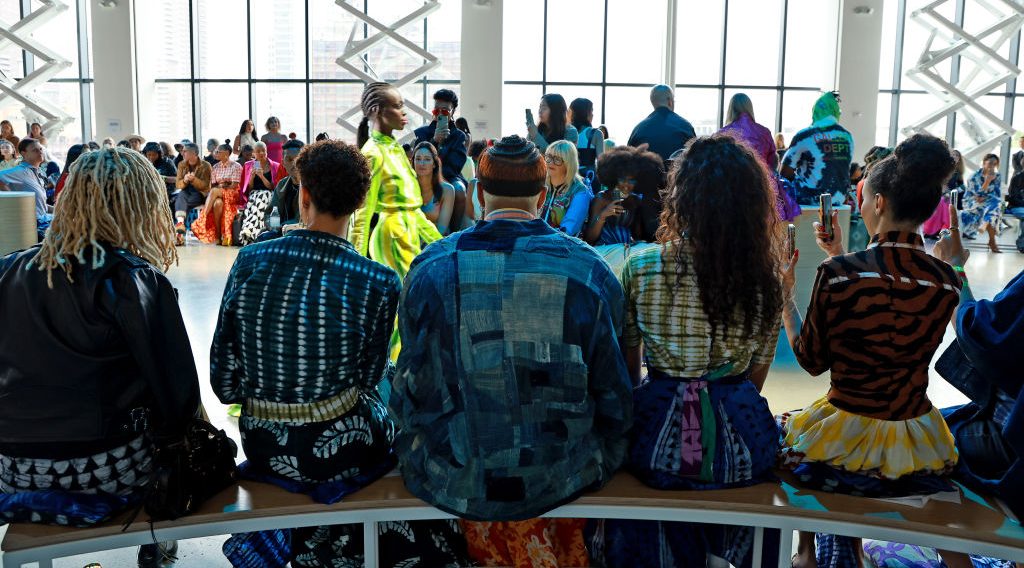We bring news that matters to your inbox, to help you stay informed and entertained.
Terms of Use and Privacy Policy Agreement
WELCOME TO THE FAMILY! Please check your email for confirmation from us.
Amid the 2023 Climate Week’s focus on climate change, these Black-owned brands are fashioning a sustainable future.
Now until Sept. 24, the Climate Group is hosting its annual Climate Week NYC. Known as the largest annual climate event of its kind, this week not only gathers business, political, and local leaders for sustainable planning but also serves as a reminder of society’s collective responsibility for climate change.
As the world grapples with the urgent realities of climate change, some brands are taking fashion-forward footsteps toward a greener future. In honor of 2023 Climate Week, theGrio spotlights Black-owned fashion brands utilizing unique, sustainable models that redefine not only eco-conscious style but also champion diversity, equity, and inclusion in the industry. Here are seven brands fashioning a better tomorrow, one conscious, climate-friendly step at a time:
Charles Harbison uses deadstock materials and waste-conscious practices in his eponymous brand to create sustainably focused fashion, jewelry, and bags. Having styled the likes of Beyoncé, Sheryl Lee Ralph, Ava DuVernay, and more, Harbison uses his architectural background and expertise in fiber arts and textile science to create conscious, diverse fashion.
“We look at [sustainability] at Harbison in a three-pronged fashion. So, we look at personal sustainability, where the sustainment of oneself is important. The sustainment of oneself is central. It has to be the nucleus of every life. We look at it as cultural sustainability, where you’re seeing through the sustaining of cultures and identities and groups of people, knowing that that is where the human experience really thrives,” Harbison explained to Banana Republic with whom he collaborated in 2021.
“And then we look at environmental sustainability, where if those two things are present, then it’s natural that you would care about the earth and be thoughtful of it because you’re caring about the people of the earth, and you’re also caring about yourself. That has been helpful in us framing a conversation that feels less rooted in a trend and more rooted in the foundation of who we are as a company and who I am as a designer.”
Taking an intersectional approach to fashionable sustainability, Taylor Jay promotes environmental consciousness while empowering women and advocating for inclusion. This womenswear brand uses ethically sourced materials, certified eco-friendly textiles, and a fair labor-practicing factory based in Oakland, California, to create environmentally safe products.
“Oak & Acorn threads eco-fabrics, historic storytelling & social impact with innovative fashion,” according to the denim brand’s website. With sustainability being the ethos of the brand, Oak & Acorn uses eco-fibers like hemp, Refibra & Tencel, recycled and repurposed denim, natural indigo artisan textiles and deadstock fabrics in its gender-neutral luxury denim designs. As a Black-owned Harlem, New York-based brand, each design pays homage to the untold history of Indigenous American and enslaved African’s contributions to American denim manufacturing.
Founded by Shanel Campbell, Bed On Water is an “interdisciplinary fashion house that produces apparel, accessories, art objects, and art media.” In addition to its unique and wide-ranging aesthetic, the brand follows a made-to-order model, which minimizes overproduction and waste. When placing an order on the brand’s site, consumers receive a “preorder note,” which gives a six-to-eight-week disclaimer for shipping due to the limited production from the company. With each piece being “made with love + soul,” Bed On Water promotes resource-efficient manufacturing by only producing items when there is customer demand.
Hope For Flowers, founded by the notable fashion designer Tracy Reese in 2019, specializes in sustainable, minimalist fashion, incorporating eco-conscious materials such as organic cotton, linen, Tencel, and cupro into its collections.
“At Hope for Flowers, we believe that by incorporating positive, social, and ecological practices into our sourcing and operating structures,” the brand’s website reads. “We can imbue our products with greater substance and offer our customers an opportunity to be a part of doing good while looking good.”
The brainchild of Canadian fashion professional Aurora James, Brother Vellies emerged in 2013 with a profound goal of preserving traditional African design practices and supporting artisanal employment. Known initially for crafting South African vellies using Springbok leather, the brand has since expanded its production footprint to encompass a global network spanning South Africa, Kenya, Mexico, Morocco, Ethiopia, Burkina Faso, Italy, Haiti, and New York City.
Incorporating a fashion lifestyle brand with a social conscience, Studio 189 was co-founded by acclaimed actress Rosario Dawson and Abrima Erwiah, a former global communications and marketing executive for Bottega Veneta. With flagship stores in New York City and Accra, Ghana, the brand collaborates closely with artisanal communities skilled in a wide range of traditional craft methods, including natural plant-based indigo dye, hand-batik, kente weaving, and more.
Haniyah Philogene is a multimedia storyteller and Lifestyle reporter covering all things culture. With a passion for digital media, she goes above and beyond to find new ways to tell and share stories.
TheGrio is FREE on your TV via Apple TV, Amazon Fire, Roku, and Android TV. TheGrio’s Black Podcast Network is free too. Download theGrio mobile apps today! Listen to ‘Writing Black‘ with Maiysha Kai.

